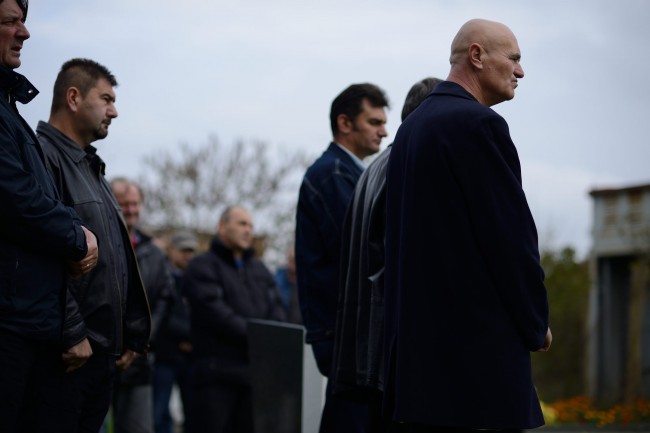You have to be somewhat of a masochist to consciously accept feeling pain and suffering. But this type of “masochism” is different. Its suffering is ennobling, it allows you to rediscover your humanity.
That’s how I would sum up my experience of working with the Center for Nonviolent Action that, from its two addresses, one in Belgrade and one in Sarajevo, has taken on the mission of peacebuilding and reconciliation in this region, primarily by working with the veterans of the Yugoslav wars from 1991 to 1999.

Our latest meeting was in Velika Kladuša. In terms of the recent war in BiH, this is the most specific city in BiH because it was the site of the tragic intra-Bosniak conflict whose repercussions can be felt in the city and the region to this day. A painful wound difficult to heal is the fact that almost 3000 people died in this conflict on both sides. And since I was myself a participant in the so-called First Autonomy, the first war between the 5th Corps[1] and units of the National Defence, I know first-hand that the fallen fighters were the youngest and most vibrant among us. It is enough to survey the dates of birth on the gravestones at Dubrava to see that the brunt of this war fell to the generation born around 1970.
A whole generation of young and able people was wiped out. And we will never know what they could have become if it had not been for the war. I too had friends and acquaintances who lost their lives on these battlegrounds. I know their families, and I know the suffering will never end. The members of the National Defence we called Autonomists and we hated them more than we hated members of the VRS that we called Chetniks. That’s what fratricidal war comes down to. You hate your own the most, because you are liable to be disappointed by those closest to you.

The initial meeting took place at the Old Town Tower whose height dominates over the Kladuša area. There were over 25 veterans from all the armies, they had come to attend a pioneering act to start the reconciliation process in this part of Krajina. The most important moments are those when we honour the dead soldiers on both sides. We first visited the graveyard of the National Defence soldiers. On the very border with Croatia lies probably the strangest graveyard I’ve ever seen. Headstones placed on the premises of a factory whose hangars have long been destroyed and overcome with undergrowth. The graveyard is tended by the association of fallen and missing members of the National Defence.
This strange graveyard seems like something straight out of the film Stalker (1979) by Andrei Tarkovsky. The graveyard is illegal, but no one touches it. The shahid turbeh to the members of the 5th Corps had to be placed in the yard of a mosque because the pro-Abdić government at the time refused to issue a building permit. Political disputes are thus conducted over the bones of the dead.
Flowers were laid for the dead and there was a minute of silence and the al-Fatiha. Brief speeches were given by Osman Zulić on behalf of the disabled war-veterans of the National Defence and the commander of the 506th brigade Nijaz Miljković. Their speeches were dignified and emotional. Both speakers openly called for reconciliation and mutual forgiveness. The faces of the other war-veterans spoke volumes. When someone speaks the truth from the heart, only one response is possible, the response of compassion and sorrow in the eyes of these seasoned warriors, today the best possible peacebuilders in the region.
Among these veterans were people who had discovered mass graves, who today socialise with those they fought hand-to-hand, people riddled with shrapnel and nightmares. But also people with an uncommon sense of humour and a desire for life. Commemorations are usually followed by comical war stories that are supposed to mitigate the sorrow that overcomes all those in attendance.

We went to the Tower later on and discussed our impressions from visits to the memorials in Kladuša. Every veteran introduces himself and briefly tells his life story, or says what impressed him most during the visit. These are the moments of catharsis. You cannot find this stuff in textbooks, and you cannot learn it. At one point, looking at the faces of the veterans, I noticed how the waiters, hearing the story of a veteran, had left their work and stepped out from behind the bar. They stood stone-till, hypnotised by the sheer force of emotion, their faces emphatic and tense.
That is the suffering from the beginning of the story. Someone has to hear the stories full of the dead, the wounded, someone has to hear the traumatic stories of beatings from the prison camps. Sometimes I am reluctant to go on these meetings of reconciliation, because I want to protect myself from difficult emotions, and because with the years you become closed off and insensitive to another’s suffering. But I always return home filled with energy and slightly beaming. Because spending time with these people restores my faith in humanity. Because I forget about all the trifles I’m burdened with in my Sarajevo life. I see it for what it is: a small, egotistical and irrelevant life full of bitterness and misery. When I return, I feel like I have been reset and filled with a better energy than the one permeating this miserable town.
That’s why suffering is good. It ennobles only those who wish to be ennobled. It is the “immeasurable minority” you should belong to. I hope for a future in which the names of these post-war heroes will echo through eternity. Those who know the senselessness of war, and are for that very reason able to show compassion for the suffering of former enemies, and help each other overcome the traumas of war.
[1] ARBiH
Photo gallery